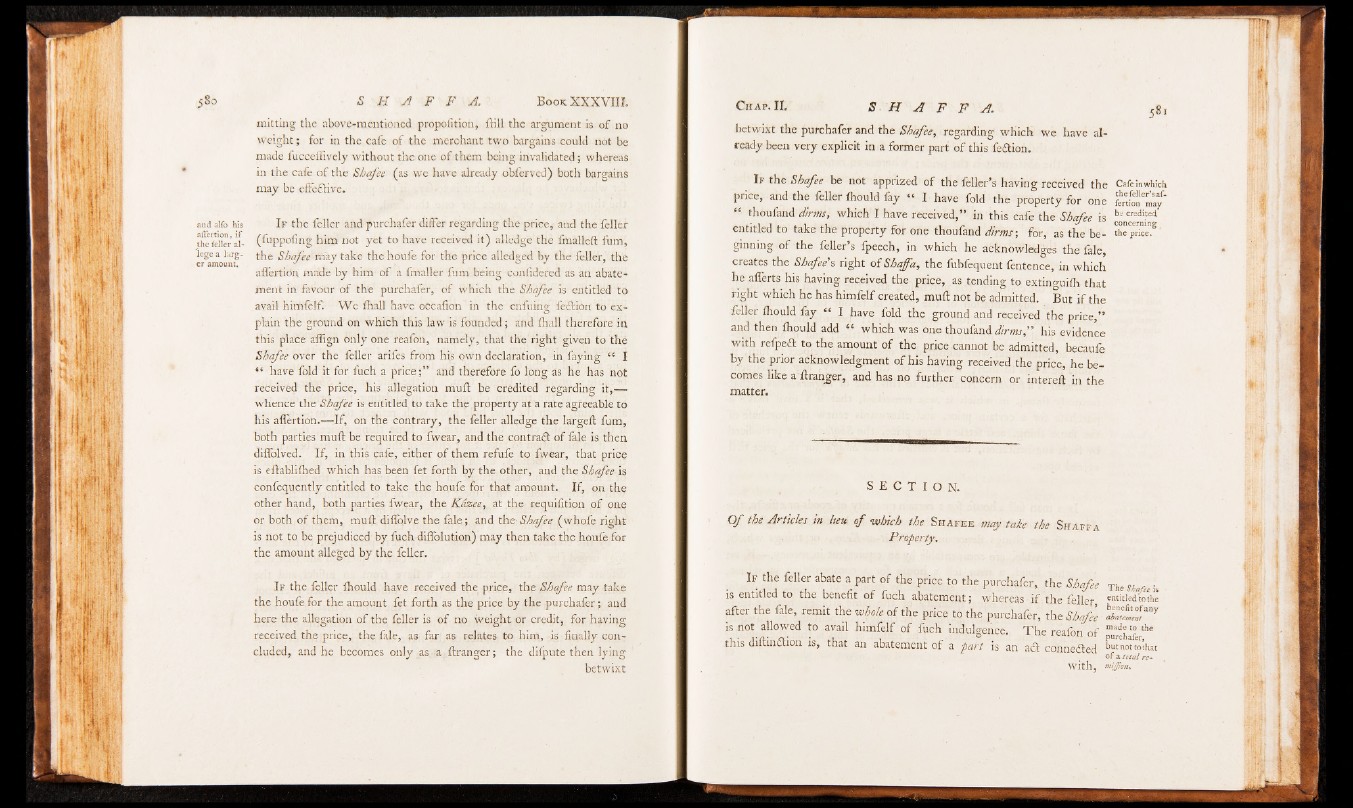
and alfo his
alTertion, if
the feller allege
a larger
amount.
S H A F F A . Book XXXVIII.
mitting the above-mentioned proportion, Hill the argument is of no
weight; for in the cafe of the merchant two bargains could not be
made fucceffively without the one of them being invalidated; whereas
in the cafe of the Shefee (as we have already obferved) both bargains
may be efïèdtive.
If the feller and purchafer differ regarding the price, and the feller
(fuppofing him not yet to have received it) alledge the fmalleft fum,
the Shafee may take the houfe for the price alledged by the feller, the
aflertión made by him of a fmaller fum being confidered as an abatement
in favour of the purchafer, of which the Shafee is entitled to
avail himfelf. We fhall have oCcafion in the enfuing fedtion to explain
the ground on which this law is founded; and fhall therefore in
this place aflign only one reafon, namely, that the right given to thé
Shafee over the feller arifes from his own declaration, in faying “ I
“ have fold it for fuch a price;” and therefore fo long as he has not
received thé price, his allegation muff be credited regarding it,—-
whence the Shafeè is entitled to take thp property at a rate agreeable to
his affertion.— If, on the contrary, the feller alledge the largeft fum,
both parties muff be required to fwear, and the contract of fale is then
diflolved. If, in this cafe, either of them refufe to fwear, that price
is effablifhed which has been fet forth by the other, and the Shefee is
confequently entitled to take the houfe for that amount. If, on the
other hand, both parties fwear, the Ktizee, at the requifition of one
or both of them, muff diflolve the fale; and the-Shafee (whofe right
is not to be prejudiced by fuch diflolution) may then take the houfe for
the amount alleged by the feller.
If the feller fhould have received the price, the Shefee may take
the houfe for the amount fet forth as the price by the purchafer; and
here the allegation of the feller is of no weight or credit, for having
received the price, the, fale, as far as relates to him, is finally concluded,
and he becomes only as, a ffranger; the difpute then lying
betwixt
betwixt the purchafer and the Shefee, regarding which we have already
been very explicit in a former part of this fedtion.
If the Shafee be not apprized of the feller’s having received the
price, and the feller fhould fay i6 I have fold the property for one
“ thoufand dirms, which I have received,” in this cafe the Shafee is
entitled to take the property for one thoufand dirms; for, as the beginning
of the feller’s fpeech, in which he acknowledges the fale,
creates the Shafee's right of Shaffa, the fubfequent fentence, in which
he aflerts his having received the price, as tending to extinguifh that
right which he has himfelf created, muft not be admitted. But i f the
feller fhould fay “ I have fold the ground and received the price,”
and then fhould add “ which was one thoufand dirms f his evidence
with refpedt to the amount of the price cannot be admitted, becaufe
by the prior acknowledgment of his having received the price, he becomes
like a flranger, and has no further concern or interefl: in the
matter.
S E C T I O N .
O f the Articles in lieu o f which the S h a f e e may take the S h a f f a
Property,
' If the feller abate a part of the price to the purchafer, the Shafee
is entitled to the benefit of fuch abatement; whereas i f the feller
after the fale, remit the whole o t the price to the purchafer, the Shafee
is not allowed to avail himfelf of fuch indulgence. T h e reafon of
this diftindtion is, that an abatement of a part is an adt connedted
with.
Cafe in which
the feller’s affertion
may
be credited
concerning
the price.
The Shafee. is
entitled to the
benefit ofany
abatement
made to the
purchafer,
but not to that
of a total re-
miffion.